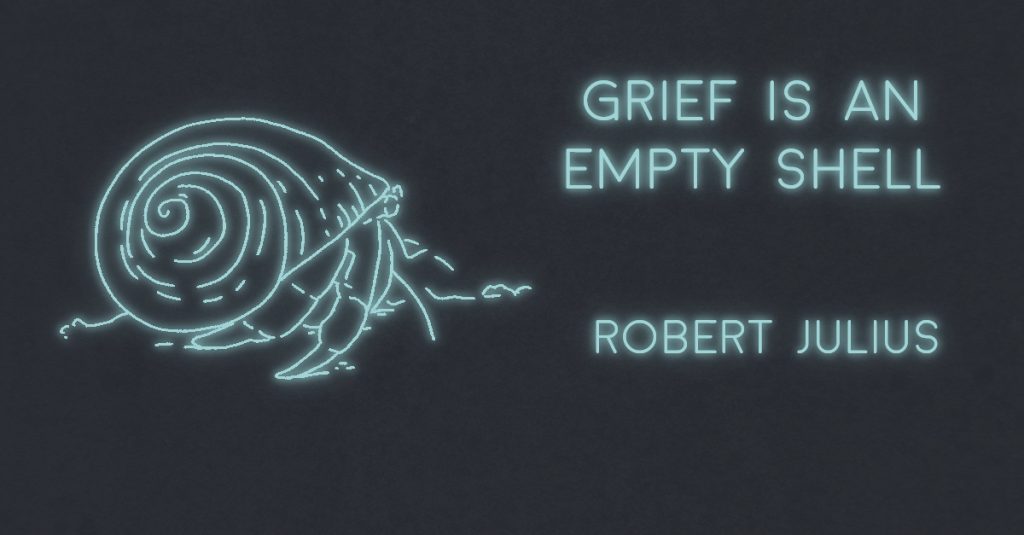When I left for California in the summer of 2013, I knew what I was leaving behind. I was abandoning a home that had grown toxic over the years, from my mother’s addiction and the ensuing fights between her and my father. I was leaving behind the rural countryside of western Pennsylvania. I was leaving behind two best friends, two brothers, two parents, and a sister who had been in and out of prison for the last five years. I was also leaving behind an old me, and all my old pastimes, including my terrarium of land hermit crabs that I had taken care of for the past ten years.
From middle school well into high school, I had been a land hermit crab enthusiast. I could explain the difference between the many species that lived around the world—how both Coenobita clypeatus and Coenobita brevimanus possess large purple claws but can be differentiated by the eyestalks and other exoskeletal differences, how one is native to the Caribbean and the other to Indonesia. I had collected crabs from all over the world, investing thousands of dollars into their care. My favorite crab, Mako, had belonged to my colony for an entire decade. I watched him grow from the size of a gumball to the size of a large apple.
Land hermit crabs are a tropical species. Though sold in pet stores and beach kiosks for cheap, their proper care is costly, and their survival demands expertise. They require constant monitoring of humidity and temperature, access to both freshwater and seawater, as well as moist substrate deep enough so that a crab can completely bury itself in order to molt. Even when given the most proper care, no member of the Coenobita species will successfully reproduce in captivity, which means that all land hermit crabs sold in pet stores or beach stands have been taken away from their native tropical habitats. California showed me how a single year can undo a decade. When I returned home from college that first summer, all of my hermit crabs—some dozen of them—had passed away under my mother’s care. Grief is an empty shell—or in this case, plural. Shells.
Part of me knew my mother wasn’t fully capable of caring for them herself, even with the detailed instructions I had left. They dried out, or starved, or were kept in a climate too cool. I didn’t know. Besides, by then, I had changed. I had given up my passion for biology and had chosen to pursue writing. I was in a stable relationship with a boy I loved. I was thinking of California and how I couldn’t wait to return. Orange County beckoned. My sophomore year was going well until October. I was woken by a call from my father. My mother had been hospitalized after complications from her gallbladder surgery.
“It’s serious this time,” he said. We were used to my mother’s frequent hospital stays, but I knew the implication these words carried.
I flew back to Pennsylvania. One day later, my mother drew her last breath.
After returning home from the hospital, I saw my terrarium, still on display in the living room, even a year after the colony had passed away. My father said that he liked the way it looked. The set-up was beautiful, crafted over the last decade to mimic the hermit crabs’ native environments, but without the familiar crawl of the crabs, the terrarium lacked spirit. Appalling, I thought, to stare into the tank and see only the empty seashells of the hermit crabs that had once lived in them.
Taking care of the hermit crabs had coincided with some of the hardest years of my adolescence. I had spent many long periods observing the crabs, calming myself on the nights that my mother would land herself in the hospital for drinking too much. I liked trying to understand their habits and what motivated them. There were friendships and pairings, as well as enemies. Sometimes, there was even cannibalism—one hermit crab would dig up another while it was in the fresh molten stage, a time at which the exoskeleton is at its softest, and tear the vulnerable crab apart, limb from limb. They were a mystery to me as much as they were something I could understand.
Days after my mom passed away, I finally lugged the 55-gallon terrarium into the basement with the help of my brother. Upstairs, the living room now appeared emptier without it, but in those weeks following my mother’s death, was there any part of life that emptiness had not touched? I fiddled through the shells that were left behind. There was a polished jade shell, as well as a long turritella I had put in as an experiment, not thinking any of the crabs would actually make use of it because of its impractical length—but Mako, like me, was something of a fashionista, and made it his home. Then, there was the great triton shell which had been home to many crabs—first, a Coenobita violascens rescued from bad pet store conditions, then belonging to Mako (of course) and finally, another crab who lived in the shell until the colony collapsed in my absence. The shells weren’t just shells. They were sentimental, physical objects of memory. Hours of my life had been spent gazing at the crabs who animated these shells, shells that had come from land and sea, produced by the great mollusks of the world. That great triton shell, named after the son of the Greek god of the sea, had first existed somewhere in the Indo-Pacific islands before the snail died and made room for a hermit crab to transform emptiness into something habitable.
We can live here, they seem to say. We can make this a home.

